欧亨利短篇小说简评
真情永驻——欧·亨利短篇小说赏析

术”,生活似乎还算美满。
后来,迪莉亚的手被烫伤才露出了真相。
乔和迪莉亚为了自己所爱的人编造了美丽真情永驻的善意谎言,安慰对方。
虽然生活艰辛窘迫.但却充满着浓情与温暖,他们是世界上最幸福的“骗子”。
——欧·亨利短篇小说赏析二、相濡以沫的友情欧·亨利不仅谱写了爱情的赞歌,还抒写了友情的高晓平篇章。
其笔下的主人公虽生活贫穷、遭遇坎坷。
但都有着伟大的抱负和自我牺牲精神,在患难与共的生活中建立了深厚的感情【1】。
《最后的常春藤叶》和《两位感恩摘要:欧·亨利的短篇小说以其语言诙谐幽默、节的绅士》讴歌了普通人之间的友情。
情节跌宕起伏、结尾出人意料而著称。
但笔者认为,欧·《最后的常春藤叶》叙述的是美国华盛顿贫民窟的亨利的作品之所以能够永葆青春,更多的是因为他能三位画家相濡以沫、彼此帮助的故事:主人公苏和琼西洞悉社会弱势群体的真实生活,描绘出他们的喜怒哀萍水相逢,情趣相投,便合租一间画室。
后来,琼西不幸乐:虽然生活窘迫.但仍然满怀对他人的爱与关心。
这患上肺炎。
苏作为她的好朋友,不但不怕传染,而且还种人间的真情正是欧·亨利小说的灵魂所在。
本文将从想方设法安慰她,耐心细致地照顾她。
琼西因病卧床,爱情、友情、亲情三个方面对欧·亨利小说进行赏析性失去了活下去的勇气.每天数着窗外常春藤树上的树的解读。
叶,认为最后一片叶子掉落之时,也将是她的生命终结关键词:真情;爱情;友情;亲情;欧·亨利之际。
这时,故事的第三个主人公老画家贝尔曼出现了。
当得知琼西的病情和她奇怪的想法后.贝尔曼十分饮誉世界文坛的短篇小说大师欧·亨利f0·Henry.着急,因为常春藤上的树叶只剩下四片了。
在华盛顿的1862—19101以其笔下栩栩如生的小人物描写来歌颂冬夜,它们坚持不了多久。
所以,在一个风雨交加的夜人间的真爱:哀婉浪漫的爱情、相濡以沫的友情、感人至深的亲情。
欧亨利比门塔薄饼赏析
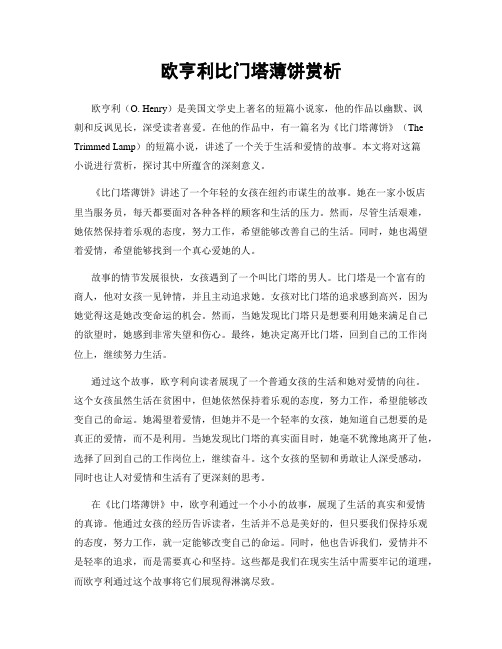
欧亨利比门塔薄饼赏析欧亨利(O. Henry)是美国文学史上著名的短篇小说家,他的作品以幽默、讽刺和反讽见长,深受读者喜爱。
在他的作品中,有一篇名为《比门塔薄饼》(The Trimmed Lamp)的短篇小说,讲述了一个关于生活和爱情的故事。
本文将对这篇小说进行赏析,探讨其中所蕴含的深刻意义。
《比门塔薄饼》讲述了一个年轻的女孩在纽约市谋生的故事。
她在一家小饭店里当服务员,每天都要面对各种各样的顾客和生活的压力。
然而,尽管生活艰难,她依然保持着乐观的态度,努力工作,希望能够改善自己的生活。
同时,她也渴望着爱情,希望能够找到一个真心爱她的人。
故事的情节发展很快,女孩遇到了一个叫比门塔的男人。
比门塔是一个富有的商人,他对女孩一见钟情,并且主动追求她。
女孩对比门塔的追求感到高兴,因为她觉得这是她改变命运的机会。
然而,当她发现比门塔只是想要利用她来满足自己的欲望时,她感到非常失望和伤心。
最终,她决定离开比门塔,回到自己的工作岗位上,继续努力生活。
通过这个故事,欧亨利向读者展现了一个普通女孩的生活和她对爱情的向往。
这个女孩虽然生活在贫困中,但她依然保持着乐观的态度,努力工作,希望能够改变自己的命运。
她渴望着爱情,但她并不是一个轻率的女孩,她知道自己想要的是真正的爱情,而不是利用。
当她发现比门塔的真实面目时,她毫不犹豫地离开了他,选择了回到自己的工作岗位上,继续奋斗。
这个女孩的坚韧和勇敢让人深受感动,同时也让人对爱情和生活有了更深刻的思考。
在《比门塔薄饼》中,欧亨利通过一个小小的故事,展现了生活的真实和爱情的真谛。
他通过女孩的经历告诉读者,生活并不总是美好的,但只要我们保持乐观的态度,努力工作,就一定能够改变自己的命运。
同时,他也告诉我们,爱情并不是轻率的追求,而是需要真心和坚持。
这些都是我们在现实生活中需要牢记的道理,而欧亨利通过这个故事将它们展现得淋漓尽致。
除了故事情节,欧亨利在《比门塔薄饼》中还运用了丰富的修辞手法和幽默的语言,让整个故事更加生动有趣。
《欧·亨利的短篇小说》读后感

《欧·亨利的短篇小说》读后感欧·亨利是一位让人敬仰的文学大师,他的短篇小说以其简洁、生动的语言和深刻的寓意而著称。
在阅读了他的作品后,我深深感受到了他对人性、生活和情感的深刻洞察,同时也被他那独特的叙事技巧所折服。
在《欧·亨利的短篇小说》中,我最喜欢的作品之一是《礼物的最高境界》。
这个故事讲述了一个男孩和他的朋友之间的友谊,以及他们之间的一次特殊的礼物交换。
通过这个故事,欧·亨利深刻地揭示了友谊的真谛,以及人与人之间的情感纽带。
这让我深思:在现实生活中,我们是否也能像故事中的男孩一样,懂得真正的友谊和珍惜他人的情感呢?另一篇让我印象深刻的作品是《最后一片叶子》。
这个故事讲述了一个老画家在生命的最后时刻,为了完成自己的作品而坚持不懈的故事。
通过这个故事,欧·亨利展现了艺术家对于艺术的热爱和执着,以及生命的意义和价值。
这让我深深感受到了艺术的力量和生命的脆弱,让我更加珍惜每一个当下。
欧·亨利的短篇小说中充满了对人性的探讨和对生活的思考。
他用简单的语言和直白的叙事,深刻地揭示了人类内心的复杂和矛盾,让人不禁感叹他对人性的深刻洞察。
在阅读这些作品的过程中,我不仅感受到了文学的魅力,也更加了解了人类的情感和生活的真谛。
总的来说,《欧·亨利的短篇小说》是一部令人深思的作品集,它让我重新审视了人性、友谊、爱情和生命的意义。
通过欧·亨利的作品,我学会了更加珍惜每一个当下,感恩生活中的点滴幸福,也更加珍惜身边的亲人和朋友。
欧·亨利的作品让我深刻地感受到了文学的力量和生活的意义,让我对未来充满了希望和勇气。
愿我们都能像欧·亨利的作品中的人物一样,勇敢面对生活的挑战,珍惜每一个美好的瞬间,活出自己的精彩人生。
欧亨利短篇小说集读后感
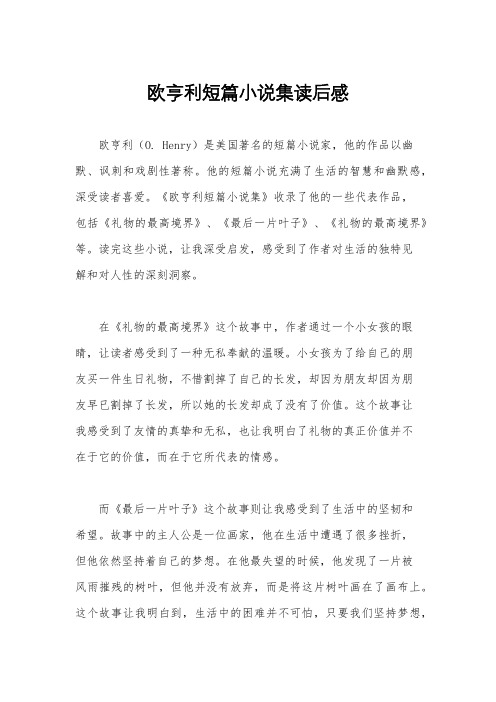
欧亨利短篇小说集读后感欧亨利(O. Henry)是美国著名的短篇小说家,他的作品以幽默、讽刺和戏剧性著称。
他的短篇小说充满了生活的智慧和幽默感,深受读者喜爱。
《欧亨利短篇小说集》收录了他的一些代表作品,包括《礼物的最高境界》、《最后一片叶子》、《礼物的最高境界》等。
读完这些小说,让我深受启发,感受到了作者对生活的独特见解和对人性的深刻洞察。
在《礼物的最高境界》这个故事中,作者通过一个小女孩的眼睛,让读者感受到了一种无私奉献的温暖。
小女孩为了给自己的朋友买一件生日礼物,不惜割掉了自己的长发,却因为朋友却因为朋友早已割掉了长发,所以她的长发却成了没有了价值。
这个故事让我感受到了友情的真挚和无私,也让我明白了礼物的真正价值并不在于它的价值,而在于它所代表的情感。
而《最后一片叶子》这个故事则让我感受到了生活中的坚韧和希望。
故事中的主人公是一位画家,他在生活中遭遇了很多挫折,但他依然坚持着自己的梦想。
在他最失望的时候,他发现了一片被风雨摧残的树叶,但他并没有放弃,而是将这片树叶画在了画布上。
这个故事让我明白到,生活中的困难并不可怕,只要我们坚持梦想,就一定能找到生活的希望。
在《礼物的最高境界》中,作者通过一个小女孩的眼睛,让读者感受到了一种无私奉献的温暖。
小女孩为了给自己的朋友买一件生日礼物,不惜割掉了自己的长发,却因为朋友却因为朋友早已割掉了长发,所以她的长发却成了没有了价值。
这个故事让我感受到了友情的真挚和无私,也让我明白了礼物的真正价值并不在于它的价值,而在于它所代表的情感。
《礼物的最高境界》这个故事让我深刻地反思了自己对待友情和礼物的态度。
在现实生活中,我们常常会忽略了身边那些默默付出的人,而对待礼物也往往只看重它的价值而忽略了它的意义。
通过这个故事,我明白了真正的礼物并不在于它的价值,而在于它所代表的情感。
而对待友情,更是要像小女孩一样,无私奉献,而不是只看重自己的得失。
另外一篇《最后一片叶子》则让我感受到了生活中的坚韧和希望。
《欧亨利短篇小说集》简介
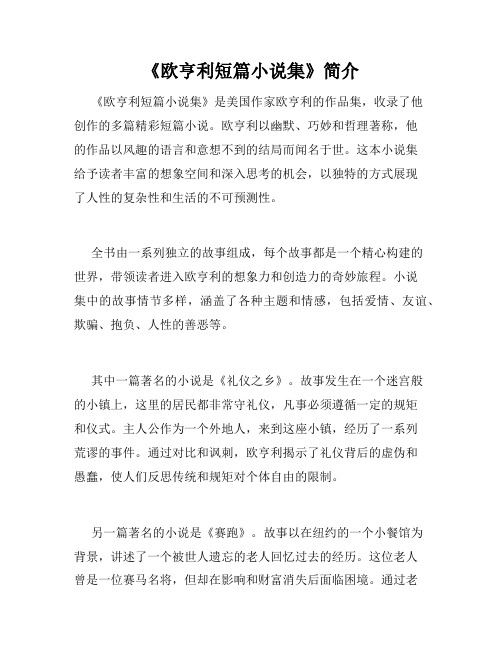
《欧亨利短篇小说集》简介《欧亨利短篇小说集》是美国作家欧亨利的作品集,收录了他创作的多篇精彩短篇小说。
欧亨利以幽默、巧妙和哲理著称,他的作品以风趣的语言和意想不到的结局而闻名于世。
这本小说集给予读者丰富的想象空间和深入思考的机会,以独特的方式展现了人性的复杂性和生活的不可预测性。
全书由一系列独立的故事组成,每个故事都是一个精心构建的世界,带领读者进入欧亨利的想象力和创造力的奇妙旅程。
小说集中的故事情节多样,涵盖了各种主题和情感,包括爱情、友谊、欺骗、抱负、人性的善恶等。
其中一篇著名的小说是《礼仪之乡》。
故事发生在一个迷宫般的小镇上,这里的居民都非常守礼仪,凡事必须遵循一定的规矩和仪式。
主人公作为一个外地人,来到这座小镇,经历了一系列荒谬的事件。
通过对比和讽刺,欧亨利揭示了礼仪背后的虚伪和愚蠢,使人们反思传统和规矩对个体自由的限制。
另一篇著名的小说是《赛跑》。
故事以在纽约的一个小餐馆为背景,讲述了一个被世人遗忘的老人回忆过去的经历。
这位老人曾是一位赛马名将,但却在影响和财富消失后面临困境。
通过老人和年轻服务生之间的对话,欧亨利揭示了成功与失败之间的微妙平衡,让人思考生活中真正重要的是什么。
除了这些,还有许多其他精彩的短篇小说。
无论是描述城市生活中的冒险与激情,还是乡村中的善良和热情,欧亨利都以敏锐的洞察力和丰富的想象力刻画了各种人物和场景。
《欧亨利短篇小说集》以其独特的风格和精细的观察力吸引了无数读者。
欧亨利的作品以简洁而优雅的语言风格,以及妙趣横生的情节和意想不到的结局,深深地打动了读者的心弦。
他通过小说中的人物和情节,揭示了人性的复杂性和社会的种种问题,让读者在思考的同时也享受阅读的乐趣。
无论是对欧亨利的作品感兴趣,还是对短篇小说的爱好者,这本《欧亨利短篇小说集》都能够让人发现其中的乐趣和智慧。
无论是欢笑,还是感动,读者都会从这些故事中找到共鸣,并深受启发。
总之,《欧亨利短篇小说集》是一本令人难以忘怀的作品,它以独特的风格和思考方式,让读者思考生活的价值、伦理和人性的面貌。
欧亨利短篇小说《最后一片叶子》赏析-(2000字)

欧·亨利短篇小说《最后一片叶子》赏析摘要:本文通过对欧·亨利短篇小说《最后一片叶子》的赏析。
进一步了解小说的形式、风格、及特点。
笔者对其以人物的对话形式来刻画人物的内心世界及特征、采用对物体细腻的描述、以及比喻拟人化的手法等来加强其逻辑性与生动性有所认识 ,并阐述己见。
此外 ,笔者认为 ,小说本身是部杰作 ,画家画出那逼真的“最后一片叶子”是另一幅杰作 ,然而 ,真正的杰作是那欧·亨利成功塑造的、值得效仿又难以捕捉到的、具有无私奉献精神的小说主人翁形象。
关键词:欧·亨利;最后一片叶子;杰作;风格;特征以短篇小说而闻名的著名作家欧·亨利 (o.henry) (1862 - 1910) 出生在美国北卡罗来纳州的格林斯堡罗。
其真名是威廉·悉尼波特 (williamsidneyporter) 。
曾做过药店职员、牧场工人 ,在成为专业作家之前 ,曾在一家银行工作。
其间 ,他时常为报刊撰写幽默小品。
因一桩经济案在监狱呆了三年零三个月。
监狱漫长的夜晚他都是靠写作度过的。
1899 年用笔名发表了第一篇小说。
1902 年他迁居纽约 ,写过不少作品 ,它们都是以其亲身经历、接触各层人士、以及所见所闻而写成。
本文所赏析的《最后一片叶子》便是其中之一。
《最后一片叶子》讲述了三个居住在纽约格林威治村的画家的故事。
苏(sue)和小乔(johnsy)在一家名叫德尔莫尼可的餐桌上遇见而相识。
由于在艺术等方面有同好 ,便相约共同租用一个画室。
半年后的一个冷秋 ,小乔不幸得了肺炎 ,病情越来越重 ,她失去了继续活下去的勇气。
她天天望着窗外常春藤上的树叶 ,看着、数着一片片地落下。
她说 ,等到最后一片叶子落下时 ,她也要撒手归去。
苏在请楼下的白蒙(behrman)老先生为她做模特儿时 ,把小乔这一可怕的幻想告诉了他。
白蒙先生听了 ,热泪盈眶 ,大声痛骂着这种愚不可及的幻想。
《欧亨利短篇小说集》赏析
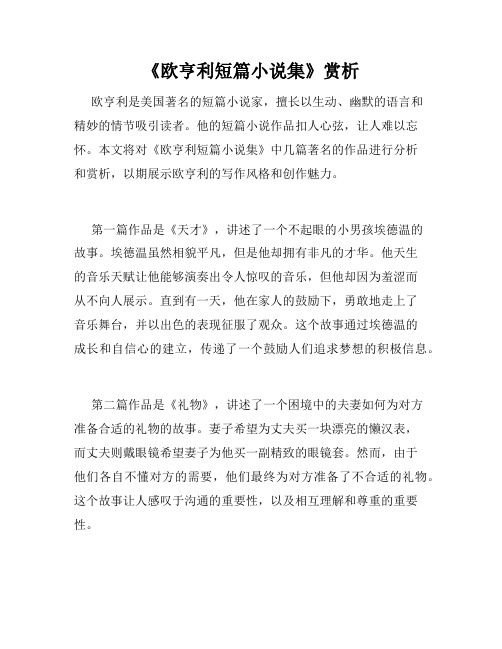
《欧亨利短篇小说集》赏析欧亨利是美国著名的短篇小说家,擅长以生动、幽默的语言和精妙的情节吸引读者。
他的短篇小说作品扣人心弦,让人难以忘怀。
本文将对《欧亨利短篇小说集》中几篇著名的作品进行分析和赏析,以期展示欧亨利的写作风格和创作魅力。
第一篇作品是《天才》,讲述了一个不起眼的小男孩埃德温的故事。
埃德温虽然相貌平凡,但是他却拥有非凡的才华。
他天生的音乐天赋让他能够演奏出令人惊叹的音乐,但他却因为羞涩而从不向人展示。
直到有一天,他在家人的鼓励下,勇敢地走上了音乐舞台,并以出色的表现征服了观众。
这个故事通过埃德温的成长和自信心的建立,传递了一个鼓励人们追求梦想的积极信息。
第二篇作品是《礼物》,讲述了一个困境中的夫妻如何为对方准备合适的礼物的故事。
妻子希望为丈夫买一块漂亮的懒汉表,而丈夫则戴眼镜希望妻子为他买一副精致的眼镜套。
然而,由于他们各自不懂对方的需要,他们最终为对方准备了不合适的礼物。
这个故事让人感叹于沟通的重要性,以及相互理解和尊重的重要性。
第三篇作品是《最后一片叶子》,讲述了一个年轻艺术家对死去老人的怀念之情。
在这个故事中,艺术家乔治对曾给予他各种帮助的老人正在垂死的时候,为老人画了一幅橙黄色的叶子画。
然而,老人在收到画前夕去世了。
乔治对老人的感激之情却从此也无法表达,他在纷纷飘落的秋叶中只找到了一片孤零零的叶子。
这个故事表达了对失去亲人的思念之情以及对生命的珍惜。
第四篇作品是《最后一枚枪弹》,讲述了一个在战场上与死神搏斗的士兵的故事。
这个士兵见到了死神的面孔,然而他却没有开枪射击。
后来,这个士兵发现,死神并不可怕,他们只是在执行自己的任务。
这个故事通过一个士兵的经历,揭示了生命的脆弱和人性的复杂。
以上仅是《欧亨利短篇小说集》中几篇作品的简要赏析。
欧亨利的短篇小说作品内容丰富多样,主题涉及生活、人性、家庭、友情等各个方面,他以生动、幽默的语言和精妙的情节为读者呈现了一个个精彩的故事。
他的作品不仅富有启发性,还远离了庸俗和肤浅的描述,给人留下了深刻的印象。
《欧·亨利短篇小说精选》读后感

《欧·亨利短篇小说精选》读后感《欧·亨利短篇小说精选》是一本集合了美国著名作家欧·亨利的经典短篇小说的精选集。
在这本书中,我们可以看到欧·亨利独特的文风和深刻的思想,以及他对人性和社会的深刻洞察。
通过阅读这些小说,我深深感受到了欧·亨利作为一个作家的才华和魅力,也对人生和世界产生了更深刻的思考。
在这本书中,有许多令人印象深刻的小说。
比如《礼物的最高境界》,这个故事讲述了一个贫穷的年轻夫妇为了给对方买礼物而做出的牺牲,最终却发现对方的礼物已经变得无用。
这个故事让我深刻地反思了人们对于物质的追求和对于爱的真正含义。
另外,还有《最后一片叶子》,讲述了一个老人为了找回他唯一珍视的一片叶子而不顾一切的努力。
这个故事让我感受到了生命的脆弱和珍贵,也让我思考了人们对于记忆和珍贵的事物的态度。
欧·亨利的小说总是充满着对人性的观察和对社会现实的反思。
他的作品中经常描绘出一些普通人的生活和遭遇,但却能从中看到深刻的道德和伦理问题。
通过这些小说,我对人类的本质和社会的现实有了更深刻的认识,也对自己的生活和行为有了更多的反思。
欧·亨利的作品让我明白了,每个人都有自己的命运和选择,而这些选择将决定我们的生活和未来。
除了对人性和社会的观察,欧·亨利的小说还充满了对生活的热爱和对美好的追求。
他的作品中经常描绘出一些温馨感人的故事,让人感受到生活的美好和人性的善良。
通过这些小说,我学会了珍惜眼前的幸福和快乐,也学会了用善良和宽容的心态去面对生活中的困难和挑战。
欧·亨利的作品是一面镜子,让我看到了自己的不足和缺陷,也让我更加珍惜和感恩身边的一切。
总的来说,读完《欧·亨利短篇小说精选》,我对欧·亨利这位伟大作家有了更深刻的了解,也对人生和世界有了更深刻的思考。
他的作品不仅给我带来了阅读的快乐,还让我在心灵上得到了一种启迪和滋养。
读书心得——《欧亨利短篇小说选》艺术风格简析
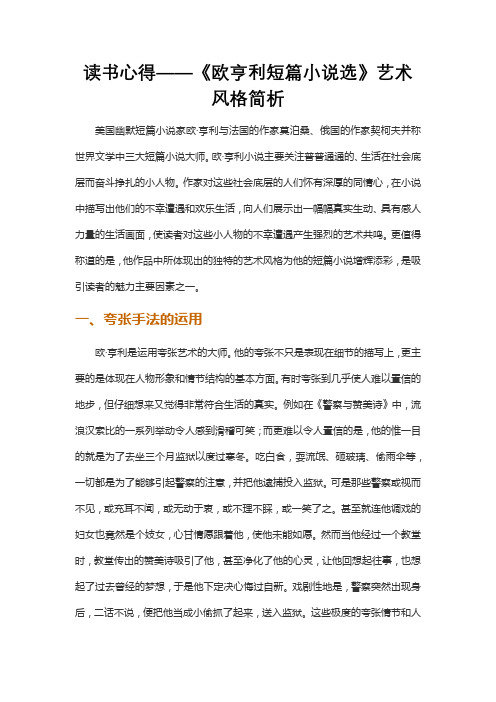
读书心得——《欧亨利短篇小说选》艺术风格简析美国幽默短篇小说家欧·亨利与法国的作家莫泊桑、俄国的作家契柯夫并称世界文学中三大短篇小说大师。
欧·亨利小说主要关注普普通通的、生活在社会底层而奋斗挣扎的小人物。
作家对这些社会底层的人们怀有深厚的同情心,在小说中描写出他们的不幸遭遇和欢乐生活,向人们展示出一幅幅真实生动、具有感人力量的生活画面,使读者对这些小人物的不幸遭遇产生强烈的艺术共鸣。
更值得称道的是,他作品中所体现出的独特的艺术风格为他的短篇小说增辉添彩,是吸引读者的魅力主要因素之一。
一、夸张手法的运用欧·亨利是运用夸张艺术的大师。
他的夸张不只是表现在细节的描写上,更主要的是体现在人物形象和情节结构的基本方面。
有时夸张到几乎使人难以置信的地步,但仔细想来又觉得非常符合生活的真实。
例如在《警察与赞美诗》中,流浪汉索比的一系列举动令人感到滑稽可笑;而更难以令人置信的是,他的惟一目的就是为了去坐三个月监狱以度过寒冬。
吃白食,耍流氓、砸玻璃、偷雨伞等,一切都是为了能够引起警察的注意,并把他逮捕投入监狱。
可是那些警察或视而不见,或充耳不闻,或无动于衷,或不理不睬,或一笑了之。
甚至就连他调戏的妇女也竟然是个妓女,心甘情愿跟着他,使他未能如愿。
然而当他经过一个教堂时,教堂传出的赞美诗吸引了他,甚至净化了他的心灵,让他回想起往事,也想起了过去曾经的梦想,于是他下定决心悔过自新。
戏剧性地是,警察突然出现身后,二话不说,便把他当成小偷抓了起来,送入监狱。
这些极度的夸张情节和人物行为的描写,在小说结尾产生的悲剧意识反衬下,不仅令人信服、拍案叫绝,而且认为这些夸张合情合理、耐人寻味。
二、出乎意料的结局夸张的情节结构安排,辅以出乎意料的故事结局是欧·亨利作品的又一重要艺术特色。
他常用出奇制胜的结尾使读者惊叹不止。
比如《人生的波澜》,山民兰西与老婆爱丽拉到治安官那儿闹离婚,治安官要去了兰西仅有的五元钱作为手续费,若判决离婚,兰西还得付给他老婆五元钱作赡养费。
欧亨利短篇小说
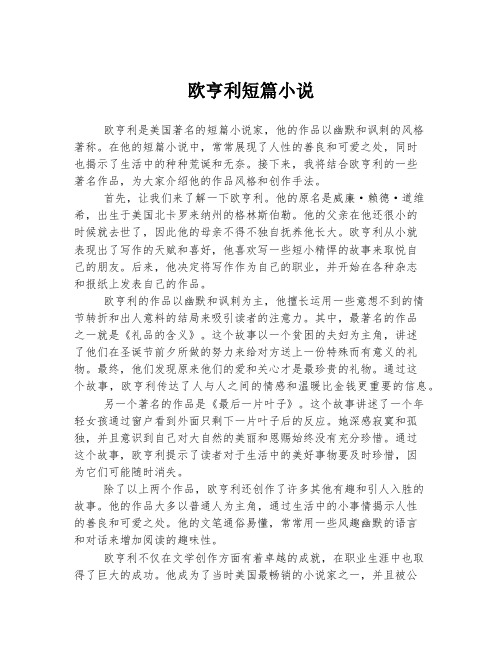
欧亨利短篇小说欧亨利是美国著名的短篇小说家,他的作品以幽默和讽刺的风格著称。
在他的短篇小说中,常常展现了人性的善良和可爱之处,同时也揭示了生活中的种种荒诞和无奈。
接下来,我将结合欧亨利的一些著名作品,为大家介绍他的作品风格和创作手法。
首先,让我们来了解一下欧亨利。
他的原名是威廉·赖德·道维希,出生于美国北卡罗来纳州的格林斯伯勒。
他的父亲在他还很小的时候就去世了,因此他的母亲不得不独自抚养他长大。
欧亨利从小就表现出了写作的天赋和喜好,他喜欢写一些短小精悍的故事来取悦自己的朋友。
后来,他决定将写作作为自己的职业,并开始在各种杂志和报纸上发表自己的作品。
欧亨利的作品以幽默和讽刺为主,他擅长运用一些意想不到的情节转折和出人意料的结局来吸引读者的注意力。
其中,最著名的作品之一就是《礼品的含义》。
这个故事以一个贫困的夫妇为主角,讲述了他们在圣诞节前夕所做的努力来给对方送上一份特殊而有意义的礼物。
最终,他们发现原来他们的爱和关心才是最珍贵的礼物。
通过这个故事,欧亨利传达了人与人之间的情感和温暖比金钱更重要的信息。
另一个著名的作品是《最后一片叶子》。
这个故事讲述了一个年轻女孩通过窗户看到外面只剩下一片叶子后的反应。
她深感寂寞和孤独,并且意识到自己对大自然的美丽和恩赐始终没有充分珍惜。
通过这个故事,欧亨利提示了读者对于生活中的美好事物要及时珍惜,因为它们可能随时消失。
除了以上两个作品,欧亨利还创作了许多其他有趣和引人入胜的故事。
他的作品大多以普通人为主角,通过生活中的小事情揭示人性的善良和可爱之处。
他的文笔通俗易懂,常常用一些风趣幽默的语言和对话来增加阅读的趣味性。
欧亨利不仅在文学创作方面有着卓越的成就,在职业生涯中也取得了巨大的成功。
他成为了当时美国最畅销的小说家之一,并且被公认为是美国短篇小说的奠基人之一。
他的作品被翻译成多种语言,并且受到了世界各地读者的喜爱。
总之,欧亨利是一位深受欢迎的短篇小说家,他的作品以幽默、讽刺和温暖著称。
《欧亨利短篇小说集》讲解

《欧亨利短篇小说集》讲解导言:在世界文学史上,美国作家欧亨利(O. Henry)是一位备受瞩目的短篇小说大师。
他的作品融合了幽默、悬疑和意外结局,深受读者喜爱。
本文将对《欧亨利短篇小说集》进行深入讲解,探索其独特之处和魅力。
第一部分:欧亨利的生平和写作风格欧亨利(1862-1910),原名威廉·波特·欧·谢特斯(William Porter O. Sheffeld),是美国最杰出的短篇小说家之一。
他在短暂的生命里创作了数百篇小说,给世界留下了宝贵的文学遗产。
欧亨利的写作风格独具匠心,叙述简洁生动,语言幽默机智,结构巧妙,以出人意料的结局见长。
他的作品常常给人带来温馨、感人和深思的体验。
第二部分:《欧亨利短篇小说集》中的经典作品1.《礼物的最高层楼》这是一篇讲述友情与奉献的温馨小说。
故事中,两位好朋友约翰和吉姆相互赠送礼物,他们都希望能给对方带来惊喜和快乐。
然而,最终他们互换的礼物却是无用的,却体现了他们深厚无私的友情。
2.《最后一片叶子》这是一篇意境唯美的小说,描绘了一个年老孤独的艺术家与一个病危女孩之间的特殊友谊。
在秋天的时节,女孩康斯兰斯突然生病住院,她最喜爱的一棵枯树的最后一片叶子在风雨中顽强地挺立。
这个小故事传达了生命的坚韧和人性的温暖。
3.《礼拜日之旅》这是一篇以幽默讽刺见长的小说。
故事主人公汤姆冯特是个贪婪的商人,为了逃避债务,他和他的妻子决定前往墨西哥。
然而,在天真无邪的三个孩子的帮助下,他们的行程充满了意外和笑料。
这个故事揭示了人性的善恶和报应的观念。
第三部分:欧亨利的作品对读者的影响欧亨利的作品深深地触动了读者的内心,给他们以启示和思考。
他通过短篇小说的形式,巧妙地展示了人性的复杂性和世间的种种困境和机遇。
他的作品积极传递了人与人之间关爱和友情的力量,引发了读者对情感生活和人性的思考和回味。
结论:通过对《欧亨利短篇小说集》的讲解,我们深入了解了这位美国文学大师的生平和写作风格。
欧亨利短小说读书笔记

欧亨利短小说读书笔记欧亨利的短篇小说,就像一个个藏着惊喜的小盒子,每次打开都能让人眼前一亮。
我最近读了不少欧亨利的作品,印象最深的就是他那独特的结尾,总是出其不意,却又在情理之中。
比如说《麦琪的礼物》,德拉为了给丈夫买一条表链,卖掉了自己美丽的长发;而丈夫为了给德拉买一套梳子,卖掉了自己珍贵的金表。
当他们互相拿出礼物的那一刻,真让人忍不住感叹生活的无奈和爱情的伟大。
还有《警察与赞美诗》,那个流浪汉苏比为了能进监狱过冬,想方设法地犯罪,可每次都阴差阳错地没能成功。
就在他被教堂里的赞美诗感动,决定重新做人的时候,却被警察莫名其妙地抓走了。
这结局真是让人哭笑不得,又觉得充满了对社会现实的讽刺。
不过,要说最让我感到有趣和温暖的,还得是《爱的牺牲》。
这故事讲的是一对年轻的夫妻,乔和德丽雅,他们都有着对艺术的热爱和追求。
乔学绘画,德丽雅学钢琴。
为了支持彼此的梦想,他们租了一间又小又破的公寓。
德丽雅的钢琴课学费可不便宜,而乔买颜料和画布也得花不少钱。
但他们俩从不抱怨,总是相互鼓励,觉得未来充满了希望。
有一天,乔回家发现德丽雅的手受伤了,缠着纱布。
德丽雅一脸轻松地说,这只是不小心烫了一下,没啥大事儿。
可乔心里清楚,德丽雅是为了练琴太拼命了。
没过多久,乔的画一直卖不出去,家里的经济越来越紧张。
乔不想让德丽雅担心,每天还是装作若无其事地出去画画。
有一天,德丽雅突然兴奋地告诉乔,她找到一个给将军家的小姐教钢琴的工作,待遇很不错。
乔也高兴坏了,觉得这下生活有了转机。
从那以后,德丽雅每天都早早出门去上课,虽然很辛苦,但她每次回家都是满脸笑容,说将军一家对她很好。
乔也更加努力地画画,希望能早点出人头地。
可是,有一天乔提前回家,却发现德丽雅正坐在那里哭泣。
乔吓坏了,以为出了什么大事。
原来,德丽雅根本就没有在将军家教钢琴,她是在一家洗衣店里帮忙,每天累得要死,手都被烫坏了。
她之所以撒谎,就是不想让乔放弃画画的梦想。
乔听了,心里又感动又难过。
读书心得——简评《麦琪的礼物》

读书心得——简评《麦琪的礼物》一、欧·亨利的写作风格及背景欧·亨利是世界著名的美国短篇小说家,他的大多数小说以20世纪早期的纽约为背景,讲述普通人的生活,呈现他们的善良、慷慨、勤奋的一面,同时揭示他们自大、吝啬、虚伪的另一面,而且深刻洞察了20世纪早期的美国社会。
他的小说以诙谐的叙事和令人意外的结局著称,也常被称为“欧·亨利式结局”。
他的写作特点可以概括为五个方面:“首先,他的写作风格很受欢迎。
简短的句子、生动的口头交谈和下层阶级的各种生活,使他的短篇小说更具可读性。
其次,写作风格具有灵活性。
他是世界著名的语言表达和人物描写大师,能够熟练运用各种句子结构和修辞。
第三,写作构思十分细腻,倾向于用不同的颜色来刻画人物,创造独特的气氛。
第四,他善于把简单的语言与扭曲的情节相结合,表现人们无私的爱和献身精神。
最后,他试图呈现美国社会的真实缩影。
欧·亨利为美国短篇小说开创了一种全新的风格,并成为其他作家短篇小说成就的试金石。
”《麦琪的礼物》写于20世纪初,这一时期,美国正经历巨大的社会变革:消费文化迅速发展,对美国人民的观念、心理和行为产生了重大的影响。
结合当时的社会背景,就会更好地理解他们为什么用这种方式表达爱:20世纪,随着资本主义迅速发展,消费文化开始盛行,礼物不再是一种私人物品,人们往往通过购买礼物来表达自己的感情。
《麦琪的礼物》为我们提供了一扇窗口,打开了探索20世纪初美国社会的视角。
二、合作原则简介美国语言哲学家保罗·格莱斯最早提出了合作原则:“我们生活在一个充满交流和对话的世界里。
在交流过程中,合作是成功沟通的基础。
当人们交流时,为了达到共同的目标并保证他们能顺利地进行谈话,参与者总是下意识地遵循一定的原则来帮助彼此相互理解和合作。
”从格莱斯的观点来看,合作原则意味着“使你所说的话,在其所发生的阶段,符合你所参与交谈的公认的目标或方向”。
为了进一步阐述合作原则,格莱斯借用德国哲学家康德所定义的数量、质量、关系和方式四个范畴的概念,每个范畴的内容称为准则,即合作原则四条准则:数量、质量、关系、方式准则。
《欧亨利短篇小说选》读后感
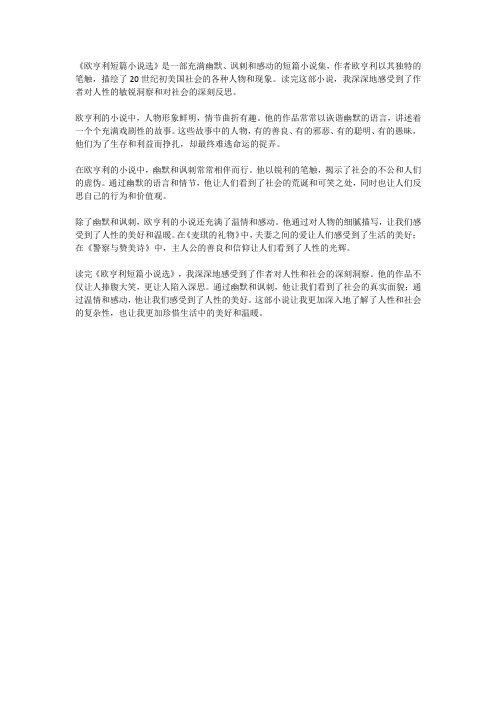
《欧亨利短篇小说选》是一部充满幽默、讽刺和感动的短篇小说集,作者欧亨利以其独特的笔触,描绘了20世纪初美国社会的各种人物和现象。
读完这部小说,我深深地感受到了作者对人性的敏锐洞察和对社会的深刻反思。
欧亨利的小说中,人物形象鲜明,情节曲折有趣。
他的作品常常以诙谐幽默的语言,讲述着一个个充满戏剧性的故事。
这些故事中的人物,有的善良、有的邪恶、有的聪明、有的愚昧,他们为了生存和利益而挣扎,却最终难逃命运的捉弄。
在欧亨利的小说中,幽默和讽刺常常相伴而行。
他以锐利的笔触,揭示了社会的不公和人们的虚伪。
通过幽默的语言和情节,他让人们看到了社会的荒诞和可笑之处,同时也让人们反思自己的行为和价值观。
除了幽默和讽刺,欧亨利的小说还充满了温情和感动。
他通过对人物的细腻描写,让我们感受到了人性的美好和温暖。
在《麦琪的礼物》中,夫妻之间的爱让人们感受到了生活的美好;在《警察与赞美诗》中,主人公的善良和信仰让人们看到了人性的光辉。
读完《欧亨利短篇小说选》,我深深地感受到了作者对人性和社会的深刻洞察。
他的作品不仅让人捧腹大笑,更让人陷入深思。
通过幽默和讽刺,他让我们看到了社会的真实面貌;通过温情和感动,他让我们感受到了人性的美好。
这部小说让我更加深入地了解了人性和社会的复杂性,也让我更加珍惜生活中的美好和温暖。
欧亨利短篇小说《最后一片叶子》赏析

欧·亨利短篇小说《最后一片叶子》赏析摘要:本文通过对欧·亨利短篇小说《最后一片叶子》的赏析。
进一步了解小说的形式、风格、及特点。
笔者对其以人物的对话形式来刻画人物的内心世界及特征、采用对物体细腻的描述、以及比喻拟人化的手法等来加强其逻辑性与生动性有所认识 ,并阐述己见。
此外 ,笔者认为 ,小说本身是部杰作 ,画家画出那逼真的“最后一片叶子”是另一幅杰作 ,然而 ,真正的杰作是那欧·亨利成功塑造的、值得效仿又难以捕捉到的、具有无私奉献精神的小说主人翁形象。
关键词:欧·亨利;最后一片叶子;杰作;风格;特征以短篇小说而闻名的著名作家欧·亨利 (O.Henry) (1862 - 1910) 出生在美国北卡罗来纳州的格林斯堡罗。
其真名是威廉·悉尼波特 (William Sidney Porter) 。
曾做过药店职员、牧场工人 ,在成为专业作家之前 ,曾在一家银行工作。
其间 ,他时常为报刊撰写幽默小品。
因一桩经济案在监狱呆了三年零三个月。
监狱漫长的夜晚他都是靠写作度过的。
1899 年用笔名发表了第一篇小说。
1902 年他迁居纽约 ,写过不少作品 ,它们都是以其亲身经历、接触各层人士、以及所见所闻而写成。
本文所赏析的《最后一片叶子》便是其中之一。
《最后一片叶子》讲述了三个居住在纽约格林威治村的画家的故事。
苏(Sue)和小乔(Johnsy)在一家名叫德尔莫尼可的餐桌上遇见而相识。
由于在艺术等方面有同好 ,便相约共同租用一个画室。
半年后的一个冷秋 ,小乔不幸得了肺炎 ,病情越来越重 ,她失去了继续活下去的勇气。
她天天望着窗外常春藤上的树叶 ,看着、数着一片片地落下。
她说 ,等到最后一片叶子落下时 ,她也要撒手归去。
苏在请楼下的白蒙(Behrman)老先生为她做模特儿时 ,把小乔这一可怕的幻想告诉了他。
白蒙先生听了 ,热泪盈眶 ,大声痛骂着这种愚不可及的幻想。
欧亨利小说鉴赏

一、欧·亨利:原名:威廉·西德尼·波特,美国人,是世界著名的批判现实主义短篇小说家。
他的一生富于传奇性,当过药房学徒、牧牛人、会计员、土地局办事员、新闻记者、银行出纳员。
他的创作紧随莫泊桑和契科夫之后,而又独树一帜,与契诃夫和莫泊桑并列世界三大短篇小说巨匠。
曾被评论界誉为莫哈顿桂冠散文作家和美国现代短篇小说之父。
他的作品有“美国生活的百科全书”之誉。
他的作品构思新颖,语言诙谐,结局常常出人意外,代表作有小说集《白菜与国王》、《四百万》、《命运之路》等。
其中一些名篇如《爱的牺牲》、《警察与赞美诗》、《带家具出租的房间》、《贤人的礼物》、《最后一片藤叶》等使他获得了世界声誉。
1、《麦琪的礼物》:为了给丈夫买一条白金表链作为圣诞礼物,妻子卖掉了一头秀发。
而丈夫出于同样的目的,卖掉了祖传金表给妻子买了一套发梳。
尽管彼此的礼物都失去了使用价值,但他们从中获得比情感更重要的东西——爱,却是无价的。
《麦琪的礼物》是美国著名文学家欧亨利写的一篇短篇小说,它通过写在圣诞节前一天,一对小夫妻互赠礼物,结果阴差阳错,两人珍贵的礼物都变成了无用的东西,而他们却得到了比任何实物都宝贵的东西——爱,告诉人们尊重他人的爱,学会去爱他人,是人类文明的一个重要表现。
2、《警察与赞美诗》:作品叙述流浪汉苏比在北美寒冷冬天来临之际想方设法到监狱过冬的过程,他处心积虑六次犯事却没有如愿,当他十分沮丧夜深归途中,听到教堂传出来炼净人心的赞美诗,内心澎湃决定重新做人时却被逮捕送进称为“冬宫”的布莱克威尔岛关押三个月。
欧·亨利的《警察和赞美诗》揭露并讽刺了虚伪的资本主义道德、反人道的法律等等,如同说曹雪芹写作《红楼梦》的动机是揭露封建社会的没落一样。
一个“罪恶累累”的人竟一次次地被认定为无罪,而一个决定改过向善的人却遭逮捕入狱。
两种荒谬背后的深刻内容:为非作歹者无人过问,有心从善者反进牢门。
这正是资本主义社会最本质的表现。
between rounds欧亨利短篇小说分析
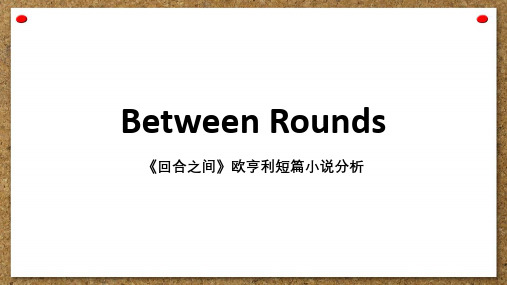
主要情节
• 《回合之间》描写一个公寓住房里的各种小市民庸俗、琐碎的生活片断,通篇都是用一 种诙谐逗趣的笔调写成的。
• 房东太太的儿子不见了,公寓里的人各种表现,欢喜冤家麦卡斯基夫妇停止了无休止的 争吵,其他的人有的帮着寻找,有的漠然,最后孩子找到了,原来是虚惊一场,而麦卡 斯基夫妇的争吵又开始继续了。
Between Rounds
《回合之间》欧亨利短篇小说分析
作者简介
• 欧·亨利是其笔名,原名为威廉·西德尼·波特(William Sydney Porter)。 • 美国著名批判现实主义作家,世界三大短篇小说大师之一。曾被评论界誉为曼哈顿桂冠
散文作家和美国现代短篇小说之父。 • 他的作品构思新颖,语言诙谐,结局常常出人意料,其中一些名篇如《爱的牺牲》、
• 这篇文章也许情节安排,结尾设置等等和欧•亨利的同类作品相比稍显苍白(结尾处和 情节中都没有带给我什么惊喜),不过值得称道的是本篇文章的语言,十分诙谐幽默, 将两个小市民的形象栩栩如生的在小说中再现了出来。也折射出了社会上普遍存在的现 象,当发现儿子走失后,邻居们有的冷漠观望、有的用于调侃、用作谈资,却并没有人 伸出援手,社会上的冷漠现象在小说中被披露得淋漓尽致,欧•亨利的批判现实主义风 格在本篇文章中得到很好的诠释。
摘选
• “Jawn,” she said, sentimentally, “Missis Murphy’s little bye is lost.’Tis a great city for losing little boys.Six years old he was.Jawn, ’tis the same age our little bye would have been if we had had one six years ago.”“We never did,” said Mr. McCaskey, lingering with the fact.“But if we had, Jawn, think what sorrow would be in our hearts this night, with our little Phelan run away and stolen in the city nowheres at all.” “Ye talk foolishness,” said Mr. McCaskey.“’Tis Pat he would be named, after me old father in Cantrim.”“Ye lie!” said Mrs. McCaskey, without anger. “Me brother was worth tin dozen bog-trotting McCaskeys. After him would the bye be named.” She leaned over the window-sill and looked down at the hurrying and bustle below.
欧亨利短小说读书笔记

欧亨利短小说读书笔记欧亨利,这位美国短篇小说巨匠,以其出其不意的结尾和对社会百态的生动描绘,让我沉浸在他所创造的文学世界中无法自拔。
读欧亨利的短篇小说,就像是走进了一个充满惊喜和意外的迷宫。
他的文字仿佛有魔力一般,将我紧紧吸引,让我随着故事中的人物一起欢笑、一起落泪。
就拿《麦琪的礼物》来说吧,德拉和吉姆这对小夫妻,为了给对方送上一份珍贵的礼物,都做出了令人感动的牺牲。
德拉卖掉了自己美丽的长发,只为给吉姆买一条配得上他金表的表链;而吉姆呢,卖掉了自己祖传的金表,只为给德拉买一套她梦寐以求的梳子。
当他们发现彼此的礼物都用不上时,那种无奈和心酸,却又被深深的爱意所掩盖。
他们的爱情,不是那种轰轰烈烈、海誓山盟的,而是在生活的琐碎中,在为对方着想的点滴里。
这种朴实而真挚的感情,让我这个读者都忍不住为他们心疼,又为他们感到幸福。
还有《警察与赞美诗》,苏比这个流浪汉,一心想要进监狱过冬,想尽了各种办法去犯罪。
他吃霸王餐、扰乱治安、偷东西,可每次都阴差阳错地没有被警察抓起来。
就在他被教堂里的赞美诗所感动,想要重新做人的时候,却被警察莫名其妙地抓走了。
这结局真的是让人哭笑不得,又忍不住深思。
欧亨利用这种荒诞的情节,揭示了社会的不公和底层人民的无奈。
在《最后一片叶子》里,老画家贝尔曼为了给病重的琼西画一片永不凋零的叶子,在风雨交加的夜晚爬上梯子,完成了他生命中的最后一幅作品。
那片叶子,不仅给了琼西活下去的希望,也让我看到了人性的光辉。
贝尔曼平时看起来脾气暴躁、一事无成,但在关键时刻,他却能展现出如此伟大的一面。
欧亨利的小说里,没有高高在上的英雄,也没有完美无缺的圣人,有的只是一个个平凡得不能再平凡的小人物。
他们在生活的重压下苦苦挣扎,却依然怀揣着对美好的向往。
比如《爱的牺牲》中的乔和迪莉娅,为了支持对方的艺术梦想,都默默地做出了巨大的牺牲。
他们住在又小又破的房子里,每天辛苦工作,却从不抱怨。
他们的爱情,在艰难的生活中愈发坚韧。
幽默家自白欧亨利批注
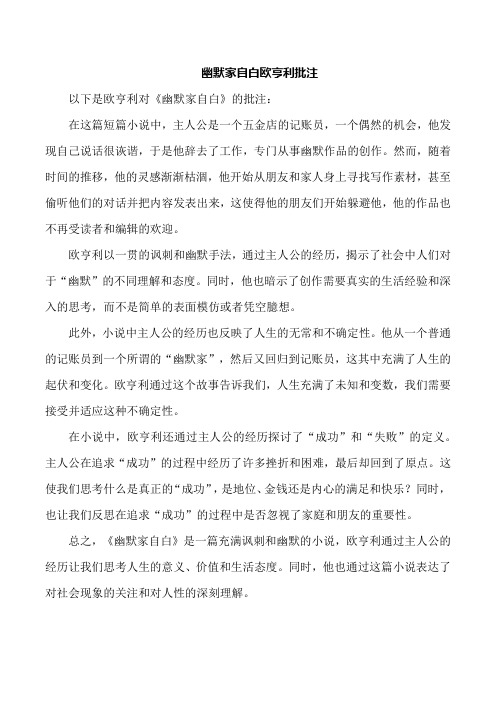
幽默家自白欧亨利批注
以下是欧亨利对《幽默家自白》的批注:
在这篇短篇小说中,主人公是一个五金店的记账员,一个偶然的机会,他发现自己说话很诙谐,于是他辞去了工作,专门从事幽默作品的创作。
然而,随着时间的推移,他的灵感渐渐枯涸,他开始从朋友和家人身上寻找写作素材,甚至偷听他们的对话并把内容发表出来,这使得他的朋友们开始躲避他,他的作品也不再受读者和编辑的欢迎。
欧亨利以一贯的讽刺和幽默手法,通过主人公的经历,揭示了社会中人们对于“幽默”的不同理解和态度。
同时,他也暗示了创作需要真实的生活经验和深入的思考,而不是简单的表面模仿或者凭空臆想。
此外,小说中主人公的经历也反映了人生的无常和不确定性。
他从一个普通的记账员到一个所谓的“幽默家”,然后又回归到记账员,这其中充满了人生的起伏和变化。
欧亨利通过这个故事告诉我们,人生充满了未知和变数,我们需要接受并适应这种不确定性。
在小说中,欧亨利还通过主人公的经历探讨了“成功”和“失败”的定义。
主人公在追求“成功”的过程中经历了许多挫折和困难,最后却回到了原点。
这使我们思考什么是真正的“成功”,是地位、金钱还是内心的满足和快乐?同时,也让我们反思在追求“成功”的过程中是否忽视了家庭和朋友的重要性。
总之,《幽默家自白》是一篇充满讽刺和幽默的小说,欧亨利通过主人公的经历让我们思考人生的意义、价值和生活态度。
同时,他也通过这篇小说表达了对社会现象的关注和对人性的深刻理解。
- 1、下载文档前请自行甄别文档内容的完整性,平台不提供额外的编辑、内容补充、找答案等附加服务。
- 2、"仅部分预览"的文档,不可在线预览部分如存在完整性等问题,可反馈申请退款(可完整预览的文档不适用该条件!)。
- 3、如文档侵犯您的权益,请联系客服反馈,我们会尽快为您处理(人工客服工作时间:9:00-18:30)。
欧亨利短篇小说述评学生姓名:指导教师:摘要:作为世界三大小说家之一,欧亨利与契诃夫和莫泊桑齐名。
他的作品因奇巧的艺术构思,出其不意的结尾而著称。
其中歌颂人性的小说是欧亨利文学创作的主流,并且许多作品已经成为了脍炙人口的名篇佳作。
同时也涌现了许多感人至深的经典人物。
表现了欧亨利对人性理想的执着追求。
本文主要分析了欧亨利的写作手法,包括精巧的情节设计,出人意料但符合逻辑的结局和幽默智慧的语言三方面,并在这基础上深刻探讨了欧亨利作品中表现出来的人性的善与恶。
关键词: 写作技巧;善;恶;人性A Brief Comment on O’ Henry’s Short StoriesUndergraduate:Supervisor:Abstract: O. Henry, one of the three most famous short-story writers in the world, enjoys equal status with Chekhov and Maupassant. Exquisite plot, wry humor and twist ending dominate his works. The main stream of his works is eulogy of humanity and his many classical works are notable. This thesis mainly analyses O. Henry’s writing style including technique plot making, surprising but logical ending and humorous and witty tone, then deeply analyses the human virtues and defects reflected in O. Henry’s works.Key Words: artistic styles; virtues; defects; human characterContents1. Introduction (1)2. Unique artistic style (1)2.1 Technique plot making (1)2.2 Surprising but logical ending (3)2.3 Humorous and witty tone (4)3. The humanity of character (4)4. Conclusion (7)Bibliography (9)Acknowledgment (10)1. IntroductionO. Henry, originally named William Sydney Porter, is a distinguished American storywriter. He wrote more than 300 short stories in his life. His stories are full of colorful characters. He creates an original, typically American democratic form of short stories with, at its best, a valuable critical awareness of life and society tellingly expressed through humor. Therefore, some critics c all him “the founder of American stories”. Being gifted with humor and a keen awareness of details, he objectively shows us what America looks like. All his stories putting together constitute a true panorama of American life.This thesis mainly emphasizes O. Henry’s unique artistic styles and the human characters. It includes two main aspects. Part one is on the unique artistic styles. O. Henry is a good plot maker, he shows readers the real life of American people by giving people a surprising but logical ending through a plausible plot making using humor and witty tone which gives readers a new open sight. Part two stresses on the human nature that contains the virtues and defects sides. In a capitalist society, the specific characters are the special society. O. Henry shows people clearly in his works.2. Unique artistic styleO. Henry's trademark is the surprising ending that each of his stories contains. He sets a story moving in one direction, and just when the reader is convinced of the general direction of the narrative, the story will be completely reversed. And if we look back to the total story, the ending seems logical and plausible. As a “plot-maker”, and designer of incident, he is an amazing genius. No one can do better than him to holds the reader in “suspense”. More than that, the reader scarcely knows that he is suspended until the very close of the story. Just as turns on the lights and the whole tale is revealed in its entirety. He uses this device of dramatic and humorous effect in the short story collection The Four Million which including “The Ransom of Red Chief ”, “The Gift of the Magi ”, and“The Cop and the Anthem”, “the Service of Love”, “The last Leaf.” He uses compact and vivid language to set a plot and portray the plot through humorous and witty tone.2.1 Technique plot makingThe short story is the one fundamental and self-contained genre in American prose fiction, and the stories of O. Henry certainly makes their appearances in consequence of the prolonged and incessant cult ivation of the genre. As a “plot maker”, he is an amazing genius. No one can better him in holding the reader in “suspense”. More than that, the reader scarcely knows that he is suspended, until atthe very close of the story. O. Henry deliberately designs the little tricks with words, for he is a master of language and not its slave.The typical feature of O. Hen ry’s stories is a twist of plot. His ultimate achievement is to create the twist ending by the plot making and compact structure. He arranges a story moving in one direction, and just when the reader is going to be convinced of the general direction of the narrative, which he takes for granted, the story is completely reversed.For example, in “The Ransom of Red Chief”, two kidnappers, Sam and Bill make off with the little son of a prominent man. According to the general expectation, readers m ay assume that they will either obtain the ransom from the boy’s father or kill the boy in the end. But the plot is totally different. The boy is such a nuisance that they agree to pay the boy’s father to take him back because they can’t stand him anymore. Although the plot far exceeds expectations, readers appreciate the cleverness of plot situation and ending a great deal while enjoying the delight of reading.In O. Henry’s works, the events of some short stories are arranged in the specific order which e xceed reader’s normal expectation to the arrangement of those events in his works, make the ending unpredictable and strange. O. Henry deliberately designs the little tricks with words, for he is a master of language and not its slave.The suspense in the story is usually employed in the plot. It is the seemingly insignificant characters that finally become the notable figures that rouse readers ponder. In “The Last Leaf”, Mr.Behrman who is only mentioned in only a short paragraph in the middle of the story to show who he is, and two paragraph tell the reader his rage about Sue ’s fully thought. The main theme of the story is that Sue takes the last fallen ivy leaf as the end of her life. Before they know the end, readers will no doubt ask some questions. Ho w does Sue’s illness? Why does the leaf stick against the wall? Does the leaf fall down? Does Sue die? Why does the author mention Mr.Behrman? The last paragraph reveals. All suspense dissolves. The leave is painted by Behrman, while Sue lives. But the old painter died in hopeless pain by Pneumonia, or rather, to rescue Sue. He has to withstand tough wind and heavy shower and the life-long masterpiece paid off by his life. When we find the plausibility of ending in the previous passage, when Mr. Pneumonia wais called in, the Johsey scarcely moves, only looking through the small Dutch windowpanes at the blank side of the next brick house, the “blank side” of brick later provides the location for Mr.Behrman’s masterpiece, the description of Mr.Behrman. He is p ast 60 and has a Micheal Angeo’s Moses beard curling down from the head of a satyr along the body of an imp. “Micheal Angeo’s Moses” leaves readers an impression of artistic potential. “Imp” can explain why he was so weak to fight against disease.The comp act structure is O. Henry’s outstanding writing technique. Events in the story are closely connected as chains of rings, which make readers eagerly interested in the ending of the story. As soon as the high light of the reverse of plots, the story ends wit hout any redundant explanations. In “The Last Leaf”, the description of Mr.Behrman, the true hero, only takes up 500 words in more than 5000 words. Meanwhile, the story dismisses a part, rousing us readers a great deal of imagination: How can old man, above 60 years old stand on the ladder, drawing a leaf on the wall in the dreadfully storming night, while his “shoes and clothing were wet t hrough and icy cold.”?Therefore, the main stream of O. Henry’s works is easily perceived: the suspense in addition to wry humor ending is his main rhetoric method.2.2 Surprising but logical endingThe ending of an article has long been considered as a conclusion or just a summary of the whole passage. However, O. Henry illustrates a new way, the so-called twist ending or sometimes the O. Henry’s ending. It means that at the end of an article the mental status or the fate of the character has changed greatly. But the whole passage is suddenly endowed with a great charm because of the ending. The author has your nerves all a quiver until the last sentence. The surprise comes quickly and the story is finished. O. Henry is such a master of the unexpected ending that one must admire his skills.In the story The Cop and the Anthem, Soapy, a homeless tramp, deciding to be sent to the prison on the Island which he called his winter quarter against the rigor and the hunger, attempted to practice several illegal activities for the purpose of “wooing capture”;(O, Henry 2004: 09) but the cop, who stood nearby when Soapy was trying to attract his attention by his anti-law behavior, paid no special attention to Soapy every time, even “seemed to regard him as a king who could do no wrong”. (O, Henry 2004: 09) Developing up here, the story must give the reader the conclusion that Soapy had to go back disappointedly to his home—a park bench. On his way, the sweet music of anthem from the church played by the organist and the beautiful moonlight scenery “wrought a sudden and wonderful change in his soul”, (O, Henry 2004: 10) he made up his mind to “pull himself out of the mire”(O, Henry 2004: 10)and “make a man of himself again”. (O, Henry 2004: 10) Moving like this, the plot is not completely understandable at once. When the reader is puzzled about the use and meaning of growing plot, and just while Soapy was planning his tomorrow’s action for being “somebody in the world”, (O, Henry 2004: 11) an unforeseen plot, and just while abruptly: he was arrested because a policeman thought him doubtful, and the next day he was sentence to “three months on the Island”. (O, Henry 2004: 11) The story stops here suddenly in spite of the reader’s not immediate understanding. But after a moment of consideration, the reader’s surprise turns into admiration for hisastonishing contrivance of tricky ending which reveals rigorously the real facts of reversal between truth and falsehood in capitalist society which confuses right and wrong.2.3 Humorous and witty toneO. Henry, a great designer, is skillful enough to dye some color of pink in a tragedy, or kind of sadness in comedy. O. Henry’s stories are humorous encyclopedia of American life. This means that this work is full of various humors, sometimes even with exaggeration. It fully discloses the essence of American society: the weak are the prey of the strong, which is regarded as the law of the jungle universally. Right and wrong are confused, good and evil are disordered; Materialism and individualism dominate people’s mind. This writing technique makes his work enjoy the fame of “Smile with Tears”.The humorous paragraph describes the congested conditions of a room where the hero and heroin live in the “The Service of Love”, the story tells of an earnest young pair of art students, the Lattabees, who prop up each other’s courage when their funds run out by pretending to have lucked into a steady income from their professional skill in painting and music. But it turns out that Delia’s service has been ironing shirts in a laundry while Joe has been firing the furnace in the same building. Readers are not surprised to find out how precious their genuine love for each other is. Monetarily they were poor, but they are mentally wealthy. We may laugh with tears after finishing reading the story. O. Henry carries an abundant good humor with hum and sees the bright and amusing side of things. O. Henry is not the comic wit that explodes the reader into a huge guffaw of laughter and vanishes. His humor and twist ending are of that deep quality that smiles at life itself and mingles our amusement with our tears.Such examples can be found throughout the story. These sentences seem to be talked about very casually to make the story appear to be a comedy. But meanwhile, we can also feel the sadness and helplessness of the hero Soapy. Readers are seduced by humor language and stories plots step by step, but finally cannot help laughing, but with pitiful tears.3. The humanity of characterAmong O. Henry’s short stories, the eternal theme proves to be the humanity. Whether simple or complex, the mystery of human motives controlled by human nature is exposed. There are good and evil elements in human nature, for the two are often mixed with each other more or less. When the good elements in human nature occupy the predominant portion, man will carry forward his virtues such as kindness, generosity, hospitality, self-sacrifice for love and friendship, helping others without asking for rewards. While the evil things defeat the good in human nature, man willdisplay such human defects as being gluttonous and lazy, rapacious, officious, vain arrogant, cowardly, impetuous etc. The human motives become more and more mysterious and various. When tempted, good man would do evil things; when moved by noble-minded people or touching things, the demon will forsake darkness for light and turn over a new leaf in his life. In O. Henry's world, established figures become boobs and rich men become dunces, while rogues become heroes and down-and-outers become gentlemen.3.1 The human virtuesHuman being has many virtues from ancient times to the present. They are kind, brave, honest, hard working, polite, thrifty, generous, hospital and so on. Some people still pay a great deal in order to maintain these virtues, they sacrifice their own happiness even their life for lofty love and friendship; they help others without asking for rewards and regard it as a pleasure; they give up their own treasure and chance to others etc. Such people bring love and fine things to the world; they are the ones who endow the world with light and hope. O. Henry has a great understanding of the trials of the lower class, and he frequently pictures the lives of ordinary people of early twentieth century America with warm and sympathetic colors. These characters are frequently the overlooked: the struggling shops girl, the unsuccessful artist, and the impoverished. Even Theodore Roosevelt said: “It was O. Henry who started me on my cam paign for office girls.” There is no denying that the narratives of humanity by O. Henry have everlasting influence. Although they are poor, le ading the life “made up of sobs, sniffles, and smiles, with sniffles pre dominating”,they still think, “If a home is happy i t cannot fit too close.”Most of O. Henry’s stories show that the humble little insignificant people of New York are just as admirable and their lives are as worthy of attention and interest and, as he implies, as respectable as the members of the Four Hundred.Take “The Gift of the Magi” as an example, we will find the ingenuity of O. Henry’s unexpected endings. From that condensation of the charm of human virtues the love-sacrificial theme is shown. It is about a young couple that is short of money but desperately wants to buy each other Christmas gifts. Unknown to Jim, Della sells her most valuable possession, her beautiful hair, in order to buy platinum as the chain for Jim's watch; unknown to Della, Jim sells his most valuable possession, his watch, to buy jeweled combs for Della's hair. The author arranges the entire plot just to get the readers to wait, to cause suspense, the pleasurable excitement and anticipation of the outcome. From the beginning, the readers keep guessing what Jim and Della will buy for each other, and the coincidence of their gift is the great suspense the author put in his article. And then he gives the answer to the question. Here is the ending: “Here I have lamely related to you the uneventful chronicle of two foolish children ina flat who most unwisely scarified for each other the greatest treasures of their house. But in the last word to the wise of these days let it be said tha t of all who give gifts.” (O, Henry 2004: 35) However, the story end comes when Jim reveals that he has sold his watch to buy Dalla her present, from where the poor couple’s love is show. Therefore, O. Henry ends the story artfully, and with deft touches he elicits the reader’s admiration and sympathy for his young couple shows love for each other more than compensates for their lack of money and material possessions. Though confronted with cruel reality and dull daily routine, Della and Jim can never change their eagerness toward love. To them the most valuable material possession is so slight and insignificant before the spiritual possession of love romance. That is sparkling with fragrant charm.There is another story about sacrifi cial theme entitled “The Last Leaf”, a warm and tragic tale describing how a dying artist proves as resilient as the last leaf on the wall outside. Sue, a poor painter, attacked by Pneumonia, wanted to turn loose her hold on everything, and go sailing down, just like one of those poor tires leave. But after beating rain and fierce gusts of wind, an ivy leaf still stands against the brick wall, which gives her the hope of living, mak ing her realize that: “It is a sin to want to die”. The ending reveals that Mr. Behrman, a kind old artist dies at previous night by pneumonia, painting the leave on an outdoor vine in the storming night ----in his effort to restore Sue’s will to live. Though the touching ending makes us absorbed in sadness, the readers can still find gleams of hope and desire out of despair. It not only enlightens the girl’s courage for better life but also moves every reader to tears. Those glittering human virtues however counterpoint to the capitalist industrial bourgeoisies’ human defeats, telling us that life is supreme and thus upgrading the theme.By and large, through the portrayal the panorama of a throng of people either of upper class or lower class, O. Henry’s eulogize the specious and precious human virtues.3.2 The human defectsOn the other hand, human beings have many defects, too. They benefit themselves at the expense of others. In order to make money they never show mercy and sympathy to the poor. They realize their own aims by hook or by crook. Their evil deeds make the world vicious. By exposing the human defects and the dark side of the world, O. Henry wants to awaken people’s conscience and their deepest desire for all good things, so that people can make their efforts to save and clean the whole world. Some people love money than anything else. In “Mammon and the Archer”, Anthony Fuckwell, a retired manufacturer and proprietor of Rockwall’ Soap, has the greatest esteem for the value of money. “I bet my money on money every time, I’ve been through the encyclopedia down to Y loo king for something you can’t buy with it, andI expect to have to take to the appendix next week, I’m for money against the field. Tell me something money won’t buy. ” (O, Henry 2004: 113) His son wants to ask for a girl’s hand but there is too little time left. Surprisingly, a fortunately traffic tie-up offers enough time for the son. But the ending discloses that it is the father who makes the accident in order to help his son to win the girl’s heart. The theme of the story come out: confronted with the Mammon even Archer has to be bent his head down. To Anthony and his peers, the only thing worthy of their thought is money. With the ironic rhetoric method, O. Henry ends the story with a fat boy without any clothes on shooting arrow around with a bow. That is pictured Cupid, in a new, unexpected way, thus bringing readers a new sense to the topic “Mammon and the Archer”. This usage of the twist ending adds artistic effect to the person’s character described.In a capitalist society, many people even do evil things against their conscience, so as to earn money. In “The Furnished Room”, the housekeeper, Mrs. Purdy, cheats a young man who is seeking his lover, in order to let him rent the room. Then the young man commits suicide out of despair. At the end, after the young man dies, we find the man’s lover commit suicide at the same rented room. Mrs.Purdy talks about it with another housekeeper in an indifferent tone as if it were only a trifle that could be the topic for gossip over dinner. The society is so doomed by an atmosphere of gloom and indifference that it makes people treat others or even friends without sympathy, equaling to committing murder.In “The Romance of a Busy Broker”, the businessman Maxwell is so crazy about his golden eternal business- make big money against the clock. More than that he even forgets he has married or not. And in a tumult of a preparation out of his work, he asks his wife to marry again. Those twist ending exploses the whole theme of the article. Are the readers to deride the broker or to show sympathy for the broker’s tender wife?The author uses pungent rhetoric methods not only to show us the humanity vividly, but also to enhance the theme: the gluttonous and cruel side of those bourgeoisies.4. ConclusionO. Henry focuses on the poverty-stricken life and spiritual depression of common people. He takes great sympathy on them, with dissatisfaction with the greediness of the rich and the noble. O. Henry is adept at seizing and grasping the typical scenes in life, in which each episode of the life of the characters that had been in dilemma and confronted fatal decision was presented. Through this, he not only chiefly portrays the hero’s mentality but also fully reveals the inner contradiction of life. Finally, the human virtues and defects emerge from the twist ending. That notonly arouses readers ponder about the humanity but also earns O. Henry’s story fame of “smile with tears”. Henry not only widens the experience of his readers, he also restates the verities that exist wherever people continue to strive for truth and beauty in life. The humanity reflected from the twist ending makes his stories at their best an influence for the furthering of those ideals that still tend to command the allegiance of civilized men. O. Henry is the “founder of American stories”. His works are like a mirror of American society at that time. A multiple of reflections are rippling through the years passing by. The plots in O. Henry’s works appear to be nothing special at first glance. Nevertheless, read those to the ending and you will find something unusual out of what seems to be too ordinary. His works are full of depth in portraying an unfathomable humanity of character.In a nutshell, O. Henry’s artistic charms will everlast and be vie wed as a perpetual encyclopedia of American life.Bibliography[1] Medrick, Fred. An introduction to American literature[M]. Henan University Press,1985[2] Hudson, Long. O Henry The Man and His Work[C]. New York:Russell and Russell,1969[3] O, Henry, Heart of the West[M]. New York: McClure, 1907[4] O, Henry, The Four Million[M]. New York: Dobleday, Doran and Company. 1906 P68[5] O, Henry, 欧亨利短篇小说[M].青海:青海出版社,2004[6] 李国宁. 欧亨利式结尾的艺术魅力[M]. 北京:清华大学出版社,2003[7] 李遇溪. 外国文学名著赏析词典[M]. 杭州:浙江文艺出版社,1988[8] 欧亨利. 四百万[M]. 北京:外语教学与研究出版社,1988[9] 荣四才. 欧亨利与欧亨利奖[J]. 外国文学. 1993(6):34-35[10] 吴伟仁. 美国文学史及选读[M]. 北京:外语教学与研究出版社,1990[11] 魏春艺. 欧亨利小说人性世界面面观[J]. 丹东师专学报,2003,P28[12] 赵书颖. “含泪的笑”与“含笑的泪”浅析欧·亨利的主题[J].黑龙江教育学院学报, 2004〈3〉. P66[13] 赵丽,黄春妮. 欧亨利作品导读[M]. 武汉: 武汉大学出版社 2003 P3AcknowledgmentAt the point of finishing this paper, I’d like to express my sincere thanks to all those who have given me hands in the course of my writing this paper. First of all, I'd like to take this opportunity to show my sincere gratitude to my supervisor, Ms. Wang Xiaoyun, who has given me so much useful advices on my writing, and has tried her best to improve my paper. Secondly, I’d like to express my gratitude to my classmates who offered me references and information on time. Last but not least, I’d like to thank those leaders, teachers and working staff in Mianyang Normal University and especially those in the School of Foreign Languages. Without their help, it would be much harder for me to finish my study this paper.。
